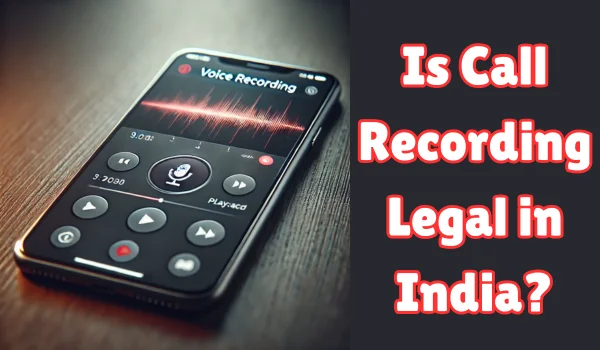It depends on who is recording the call and for what purpose. Call recording is legal in India if it is done with the consent of at least one party involved in the conversation. However, recording a call without consent and using it for unlawful purposes may be illegal under various Indian laws, including the Indian Telegraph Act, 1885, the Information Technology (IT) Act, 2000, and the Right to Privacy under Article 21 of the Indian Constitution.
Legal Framework for Call Recording in India

1. Indian Telegraph Act, 1885 – Government’s Right to Intercept Calls
Section 5(2) of the Indian Telegraph Act, 1885, allows the government to intercept or monitor phone calls only under specific circumstances, such as:
- ✔ National security concerns
- ✔ Public safety reasons
- ✔ Investigation of criminal activities
Unauthorized call tapping or interception by private individuals is illegal.
2. Information Technology (IT) Act, 2000 – Cyber Law Provisions
Section 66 of the IT Act, 2000 makes it a punishable offense to record or intercept electronic communications (including phone calls) without authorization.
Violators can face imprisonment of up to three years and fines.
3. Right to Privacy – Supreme Court’s Ruling
In the Puttaswamy Judgment (2017), the Supreme Court of India recognized the Right to Privacy as a fundamental right under Article 21.
Recording a call without consent may be considered a violation of privacy, especially if the recording is used for malicious purposes.
When is Call Recording Legal in India?
✔ Personal Use (One-Party Consent Rule)
- If one person involved in the call records it for personal use, it is not illegal.
- Example: Recording a conversation to keep as proof of an agreement.
✔ Business & Customer Service Calls
Companies can record calls for quality and security purposes, but they must inform the customer in advance (e.g., “This call may be recorded for quality assurance”).
Example: Banks, customer service centers, and telecom companies record calls legally.
✔ Evidence in Legal Disputes
Courts accept recorded calls as evidence, provided they are genuine, relevant, and not tampered with.
When is Call Recording Illegal in India?
❌ Recording Calls Without Consent & Using Them for Malicious Purposes
If someone records a call without permission and uses it for blackmail, harassment, or defamation, it is illegal and punishable under IPC Sections 354 (outraging modesty), 503 (criminal intimidation), and 507 (anonymous threats).
❌ Third-Party Call Recording (Without Court Approval)
If a third party (someone not involved in the call) records or taps a phone conversation without authorization, it violates privacy laws and is considered illegal surveillance.
❌ Publishing Private Calls Without Consent
Sharing or publishing someone’s private conversation without their consent can lead to legal action for defamation and breach of privacy.
Legal Consequences of Illegal Call Recording
🚨 If someone records or intercepts a call unlawfully, they may face:
✔ Criminal Charges under the IPC and IT Act.
✔ Fines and imprisonment of up to three years.
✔ Civil liability for damages in case of privacy violations.
Conclusion
Call recording is legal in India under certain conditions, but it must follow privacy laws. Individuals can legally record their own calls but cannot intercept third-party calls without permission. Businesses must inform customers before recording conversations, and unauthorized call recording for illegal purposes can lead to severe legal consequences. To stay within the law, it is always best to obtain consent before recording any call

Hi, I am Kapil Kumar, founder and chief editor of indiasvibes.com, a platform delivering the latest updates on business, finance, entertainment, and sports. With a passion for insightful storytelling, I am and my team ensures our readers receive accurate and engaging content.

